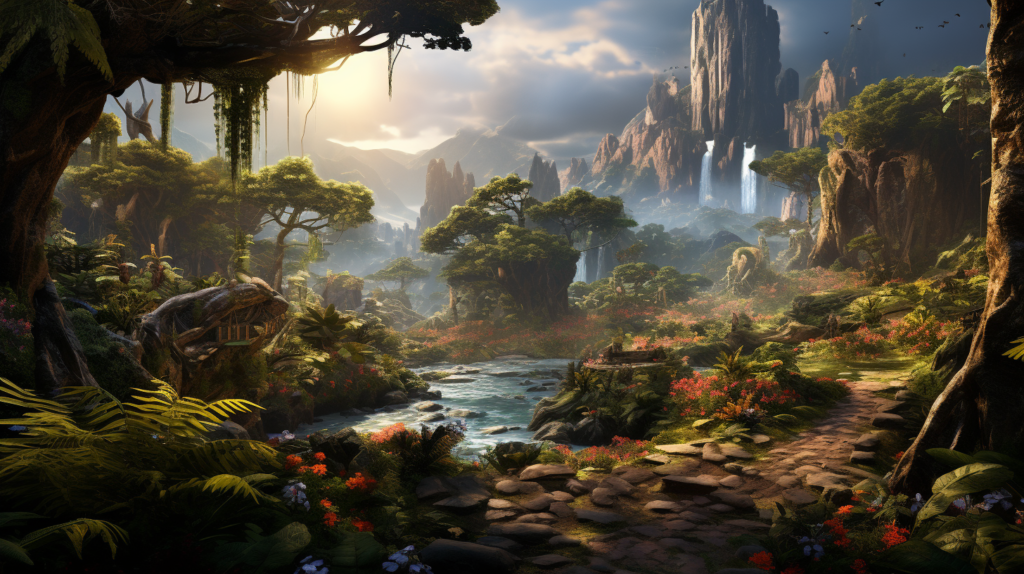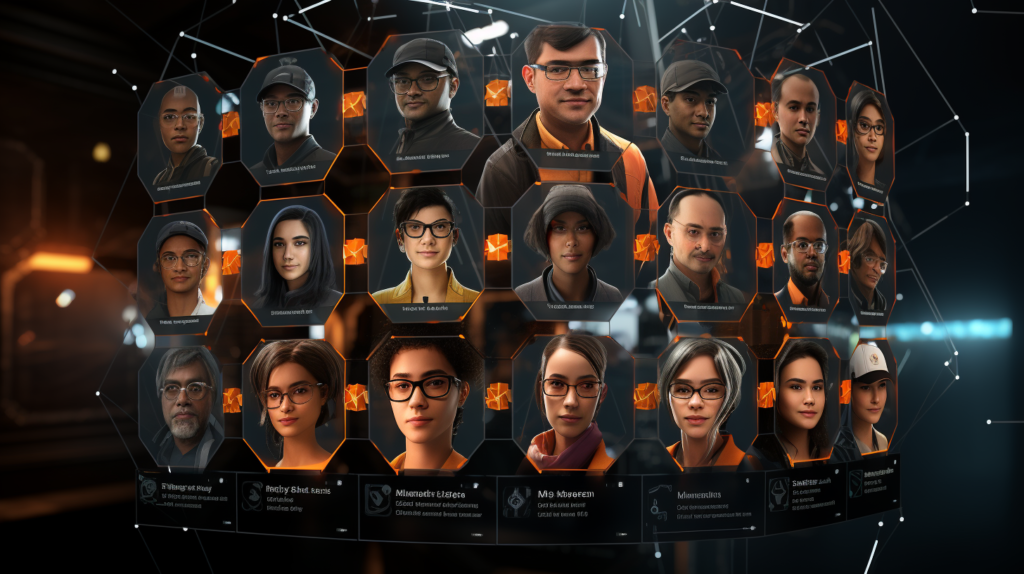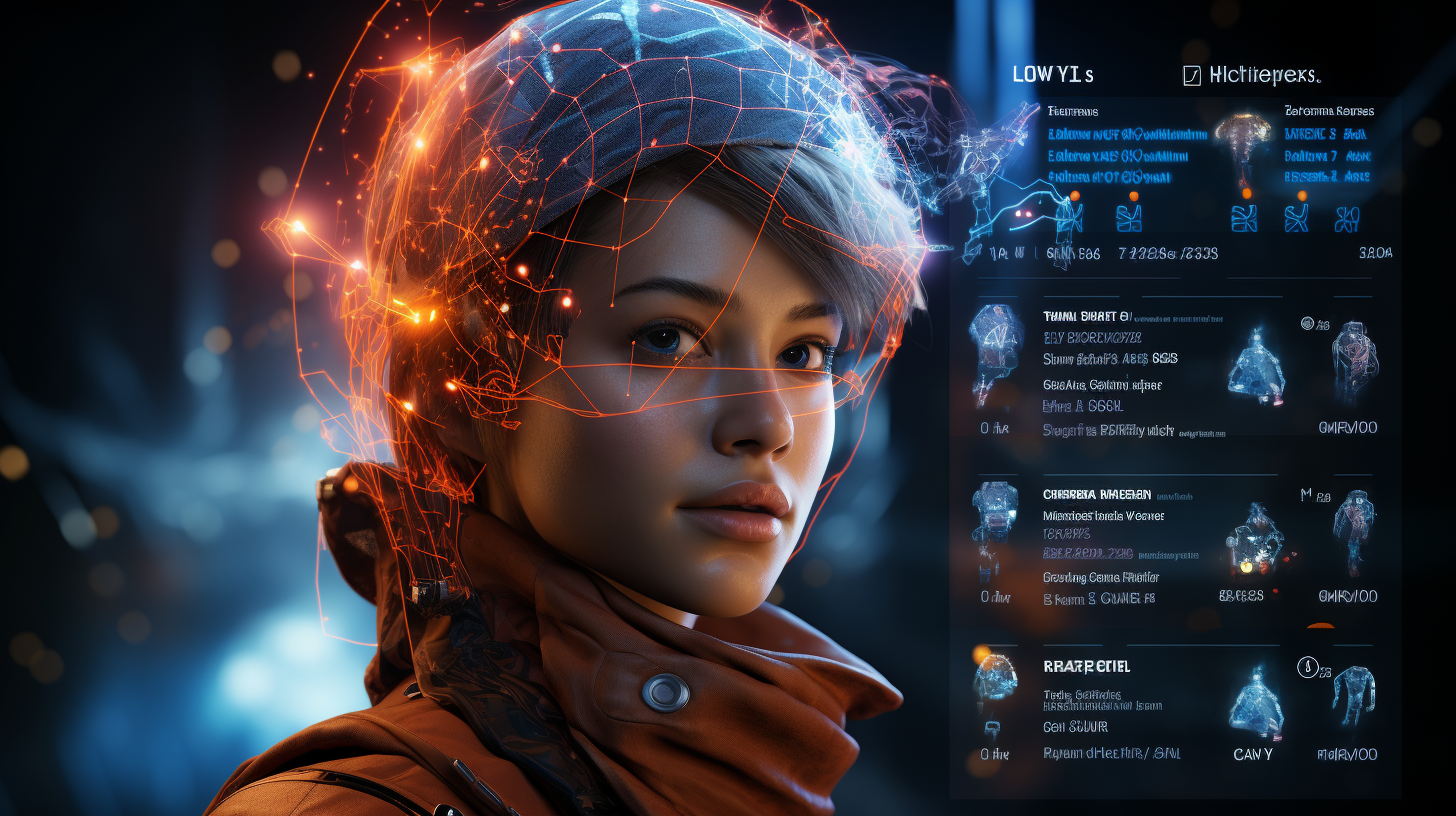In recent years, the integration of artificial intelligence (AI) in various industries has revolutionized the way we approach problem-solving and automation. One particular field that has seen tremendous advancements in game development. With the advent of generative AI, game designers, and developers have found innovative ways to enhance gameplay, create immersive environments, and streamline the game development process. In this article, we will explore how generative AI is used in gaming, provide an example of its application, and discuss the growing role of AI technology in the game industry.
How Generative AI is Used in Gaming
Generative AI, a subset of artificial intelligence, refers to systems that are capable of producing creative and original content. In game development, generative AI techniques are employed to generate various game elements, such as characters, levels, landscapes, and even narratives. By leveraging AI algorithms, game designers can create dynamic and interactive game worlds that adapt to player actions, providing a more personalized and engaging experience.
One prominent application of generative AI in gaming is procedural generation. This technique involves using AI algorithms to automatically generate game content, such as terrain, maps, and textures. By employing procedural generation, game developers can create vast and diverse game worlds without the need for extensive manual design work. This not only saves time and effort but also enables the creation of unique and unexpected gameplay experiences for players.

An Example of Generative AI in Game Development
To better understand the impact of generative AI in game development, let’s take a look at an example: No Man’s Sky. Developed by Hello Games, No Man’s Sky is an ambitious space exploration game that features a procedurally generated universe containing billions of unique planets, each with its own distinct ecosystems and resources. The game utilizes generative AI algorithms to create an entire universe that players can explore, discover, and interact with.
In No Man’s Sky, the generative AI system generates planets on the fly, taking into account various parameters such as climate, terrain, flora, and fauna. This allows for an almost infinite number of unique planets to be created, providing players with a truly immersive and expansive gameplay experience. The use of generative AI in No Man’s Sky demonstrates how AI development can push the boundaries of game design and create more interactive and dynamic virtual worlds.
Game Developers and AI
With the rapid advancements in AI technology, game developers are increasingly incorporating AI systems into their workflows. AI development tools and frameworks are now readily available, making it easier for game companies and designers to harness the power of AI. By using AI in their game development process, developers can automate repetitive tasks, optimize resource allocation, and even create AI-controlled characters that exhibit intelligent behavior.
For instance, AI can be employed to train non-player characters (NPCs) in games to exhibit more realistic and adaptive behaviors. NPCs can learn from player interactions, adapting their strategies and decision-making based on the player’s actions. This enhances the overall gaming experience by providing challenging and dynamic gameplay, leading to more immersive and engaging encounters.
Moreover, AI technology can assist game designers in playtesting and balancing game mechanics. AI algorithms can simulate thousands of gameplay scenarios, identifying potential issues and suggesting improvements. This not only saves time but also helps in creating more balanced and enjoyable games for players.
The Future of Generative AI in Game Development
As AI technology continues to advance, the role of generative AI in game development is set to grow even further. Game companies are investing in AI research and development, aiming to create more sophisticated and intelligent virtual worlds. The use of AI algorithms to generate lifelike characters, realistic physics, and complex narratives will become increasingly common.
Additionally, the integration of machine learning techniques within generative AI systems holds great potential for enhancing game development. By analyzing player behavior and preferences, AI algorithms can adapt the game experience in real time, tailoring it to individual players and creating highly personalized gameplay. This level of customization can lead to deeper player engagement and longer-lasting gaming experiences.
Will AI Replace Game Designers?
The rapid advancements in artificial intelligence (AI) have sparked discussions about its potential impact on various industries, including game design. The question arises: will AI replace game designers in the future? In this article, we will delve into this topic and explore the role of AI in game design.
The Role of AI in Game Design
While AI technology has the potential to streamline certain aspects of game development, it is unlikely to completely replace game designers. Game design involves a complex blend of creativity, storytelling, and understanding player experiences. AI, on the other hand, is proficient in data analysis, pattern recognition, and automation. By combining the strengths of AI and human game designers, a more efficient and innovative design process can be achieved.
AI can assist game designers by automating certain repetitive tasks, such as generating terrain, textures, or non-player character behaviors. This frees up valuable time for designers to focus on more creative aspects of game development, such as narrative design, gameplay mechanics, and player engagement. AI can serve as a powerful tool in the hands of game designers, augmenting their abilities rather than replacing them.
Will AI Replace Computer Science (CS)?
AI development and computer science are closely intertwined, but it is unlikely that AI will replace the entire field of computer science. AI is a subfield of computer science that focuses on creating intelligent systems capable of learning, reasoning, and decision-making. While AI has made significant advancements in various domains, it is just one aspect of the broader field of computer science.
Computer science encompasses a wide range of disciplines, including algorithms, data structures, software engineering, networking, and more. AI, although a prominent area within computer science, is not comprehensive enough to replace the entirety of the field. AI technologies and techniques are integrated into many applications and systems, but they do not supersede the foundational knowledge and skills required in computer science.
Can an AI Play a Game?
Yes, an AI can play a game. In fact, AI-powered game-playing agents have demonstrated impressive capabilities in recent years. AI algorithms can be trained to play games by observing and analyzing vast amounts of gameplay data. Through this process, AI agents can learn strategies, make decisions, and even compete against human players.
AI game-playing agents have achieved remarkable success in various games, such as chess, Go, and poker. DeepMind’s AlphaGo, for example, defeated world champion Go players, showcasing the power of AI in complex game scenarios. These AI agents employ advanced techniques like reinforcement learning, neural networks, and Monte Carlo tree search to make intelligent moves and adapt to changing game states.
However, it is worth noting that while AI agents excel in specific games, they lack the broader understanding, intuition, and creativity that human players bring to the gaming experience. Human players often value the emotional and social aspects of gaming, which are yet to be fully replicated by AI systems.
Is Game Theory an AI?
No, game theory is not an AI. Game theory is a branch of mathematics and economics that studies strategic decision-making in situations where multiple participants or players are involved. It provides a framework for analyzing the interactions and choices of rational agents in competitive or cooperative settings.
While game theory can be used in conjunction with AI to inform decision-making processes, it is not an AI itself. AI, as mentioned earlier, refers to the development of intelligent systems that can learn, reason, and make decisions. Game theory provides a theoretical foundation for understanding strategic interactions, but it does not possess the autonomous capabilities associated with AI systems.

Has Video Game AI Improved?
Over the years, video game AI has indeed improved significantly. As technology advances and computational power increases, game developers have been able to create more sophisticated AI systems. Video game AI encompasses various aspects, including non-player character behaviors, enemy AI, pathfinding, and decision-making.
In the past, video game AI often relied on scripted behaviors or simple rule-based systems. However, with the advent of machine learning and neural networks, game developers can now train AI models to exhibit more intelligent and adaptive behaviors. AI-controlled characters can learn from player interactions, adjust their strategies, and provide a more challenging and realistic gameplay experience.
Furthermore, AI algorithms have become more efficient, enabling larger-scale simulations and more complex game environments. This has led to more immersive and dynamic game worlds, where AI-controlled entities can exhibit complex interactions and behaviors.
What is the Disadvantage of AI in Games?
While artificial intelligence (AI) has brought significant advancements to the field of game development, it is not without its disadvantages. It’s important to consider the potential drawbacks of AI implementation in games. In this article, we will explore one key disadvantage of AI in games and discuss its implications.
The Issue of Overpredictability
One notable disadvantage of AI in games is the risk of overpredictability. AI algorithms are designed to analyze patterns, learn from data, and make decisions based on the information available to them. However, if the AI’s decision-making process becomes too predictable or repetitive, it can lead to a less engaging and challenging gameplay experience for the players.
When players are able to anticipate the AI’s actions with high accuracy, it diminishes the sense of immersion and excitement. It can result in players finding optimal strategies to exploit the predictable behavior of AI opponents, leading to repetitive gameplay and reduced replayability. This can be particularly noticeable in competitive games where the AI-controlled opponents become too easy to defeat once their patterns are identified.
Balancing AI Predictability and Challenge
Game developers face the challenge of striking the right balance between AI predictability and providing an enjoyable and challenging experience for players. AI should be intelligent enough to provide formidable opponents or allies, while still being adaptable and capable of surprising players. Achieving this balance requires careful design and fine-tuning of AI behaviors.
One approach to address the issue of over-predictability is to introduce dynamic or adaptive AI. This involves incorporating algorithms that allow the AI to learn and adjust its behavior based on the player’s actions and performance. By introducing a degree of unpredictability, the AI can keep players on their toes and maintain an engaging gameplay experience. Adaptive AI can enhance replayability and create more immersive and challenging game scenarios.

What Was the First Game with AI?
The first game to feature AI can be traced back to the early days of video games. In 1952, a game called “Bertie the Brain” was created by Josef Kates for the Canadian National Exhibition. Bertie the Brain was a tic-tac-toe game, and it featured a computer-controlled opponent that could play against human players.
While the AI in Bertie the Brain was relatively simple compared to modern standards, it marked an important milestone in the history of gaming. The game demonstrated the potential of using computers to simulate intelligent behaviors and provide interactive experiences for players. Since then, AI in games has evolved significantly, becoming more sophisticated and capable of handling complex game mechanics.
Can AI Speed Up Game Development?
Yes, AI has the potential to speed up game development processes. AI development tools and techniques can assist game developers in various aspects of the game creation pipeline, helping to streamline and automate certain tasks.
One area where AI can accelerate game development is content generation. For example, AI algorithms can be used to generate terrain, textures, or even entire levels. This saves time and effort for game designers, allowing them to focus on other critical aspects of game development, such as narrative design and gameplay mechanics.
AI can also enhance playtesting and quality assurance processes. AI algorithms can simulate thousands of gameplay scenarios, identifying potential issues and suggesting improvements. This can significantly reduce the time and resources required for playtesting, ensuring that games are more balanced and enjoyable for players.
Furthermore, AI-assisted procedural generation techniques can generate diverse and unique game content, enabling developers to create larger and more immersive game worlds efficiently. This not only speeds up the development process but also enhances the overall player experience.
Conclusion
In conclusion, generative AI has become a game-changer in the world of game development. Its ability to automate content generation, create dynamic game worlds, and optimize gameplay experiences has opened new doors for game designers and developers. As AI technology continues to advance, we can expect even more innovative applications of generative AI in the gaming industry. By embracing AI development, game companies and designers can unlock new possibilities and take their games to new heights of creativity and engagement.
While AI has made significant advancements in game development and video game AI has improved over time, it is important to recognize that AI is not likely to replace game designers or the field of computer science. Instead, AI serves as a powerful tool to augment the abilities of game designers and enhance various aspects of game development. By carefully balancing AI predictability and incorporating adaptive behaviors, game designers can create engaging and challenging experiences for players.




